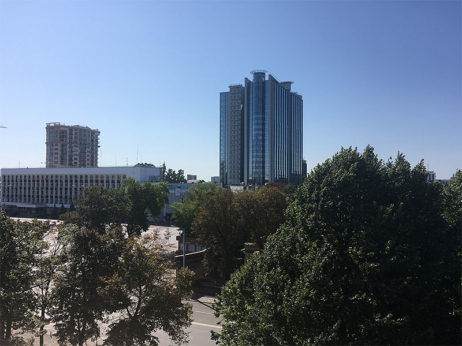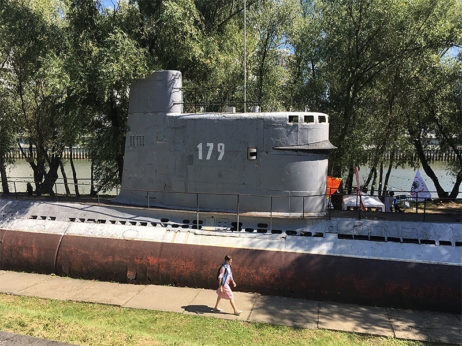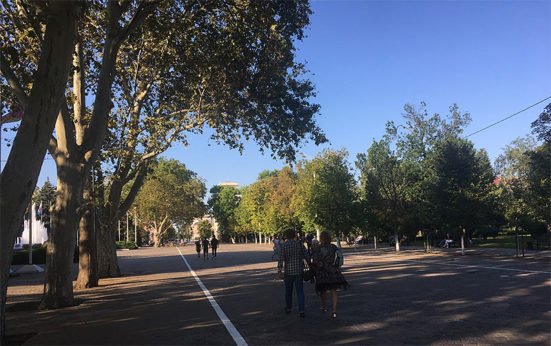
This visit and the article based on it took place before the outbreak of the current coronavirus pandemic.
KRASNODAR, Russia—This was my first trip to Russia. I’ve had prior invitations that I couldn’t accept. I had taken enough credit hours in college to major in Russian, but college was over 45 years ago, and before I had begun my legal career. This trip was therefore long overdue.
Many things were unexpected and a great surprise. First off, there was the Moscow airport, Sheremetyevo. It is very modern. Red Square is smaller than it appears in pictures. And Krasnodar turned out to be a very bright, sunny city in the south, with new construction around most corners—a lot like Florida—with Crimea, Sochi and the Black Sea close by. Russia was not the dark place that I expected. We even had a barbeque.
I found so much that was similar to the USA. Even the people seemed like Americans, though of course, they all spoke Russian. There were no dull, colorless scenes of sullen, suspicious people. Instead, there were billboards, traffic jams, and neon signs, like any regular consumer society. It was certainly not what former Senator John McCain called “a gas station masquerading as a country.”
My trip was organized by the Center for Citizen Initiatives, a group associated with the Rotary International, that organizes trips like this every year. The tour group consisted of 48 people from all backgrounds, some of whom had made this trip before. In Moscow, we heard speakers presenting on Russian politics, history, and finance. This lasted for five days. We also saw some of the city. Then we broke up into groups destined for twenty-one cities, four of us flying on to Krasnodar. After our visit to Krasnodar, we flew to St. Petersburg to reunite with the group for the final five days.
Moscow is an entry city, making it a popular city for tourists. It has an amazing subway system with fares of less than a nickel. However, when we flew in and out of the city, I saw a large gray umbrella of smog. It has great mass transit, but too much traffic, so there were colossal traffic jams and very bad air.
St. Petersburg is another matter. It is the most beautiful city in Russia, simply gorgeous and historic. The main events of the Russian Revolution took place here and it is home to the deservedly famous Hermitage museum. The city was crowded with lots of tourists, mostly from Germany and China. St. Petersburg is also where a visitor can most easily feel and understand the great suffering the Russians endured during the Great Patriotic War, which is what they call World War II. On the downside, some of the cab drivers in St. Petersburg left us with some unpleasant memories.

Krasnodar is much less historic than St. Petersburg, but also less crowded and very welcoming. The air was clean, and there was always a breeze. The Black Sea is nearby, and the city seems alive. It is where I had the most interactions with Russian people.
The Russians we met welcomed interactions with us. Ever-present was the interest of the Russians to know and meet Americans. They were educated and cultured, wanted to be understood and could not have been more hospitable. We were provided two people to translate and introduce us to the city, and while staying in a downtown hotel, I also met and talked to some Russians individually. Others in the group had home stays. From these interactions, it was clear how little we know about life in Russia.
I learned that while there are many expensive cars on the streets and large private houses, there are also many people doing poorly. Much like in the United States, teachers are badly paid, many young people have a hard time finding suitable employment, and owing to very low pensions, the condition of the elderly is desperate. Along with the income inequality, Russians have lost most of the social benefits of socialism and its welfare systems, while corruption, we were told, is part of everything. This has encouraged many young Russians to leave, and there is a degree of nostalgia for the security and stability of the Soviet state.
Krasnodar growth
Over the five days we toured the city, we met with business people, all of whom were business owners. These people are very much into entrepreneurship in a rapidly rising area of Russia. Among our visits, we visited one company and one government agency whose primary purpose is to help entrepreneurs and businesses, including foreign ones, to grow and get started. They help with licenses, referrals to other professionals, and arrange financing and training. Their offices were crowded during our visit.
It is all having an effect. As in the United States, Russia has a slow population migration to the south. Krasnodar has doubled in population over the last ten years. Construction cranes and large new office and housing blocks are all over the city. The city is expanding with new businesses, lots of traffic jams, and a shopping mall, but many of the suburbs still have rutted roads. They don’t seem to have gotten the idea of a planned subdivision down. One business we visited did mapping, similar to Google Maps, but also kept track of business turnover. According to them, in the area, approximately 1400 new businesses open up each month while 1300 go under.
Benefits of sanctions
It was not anyone’s intention, but part of this growth is due to European and American sanctions. We were told that when the European and American sanctions started, Russia was heavily dependent on Europe for its food supply, financing, and manufactured goods. In 2008, an estimated 45% of Russian food was imported from Europe. Today, with government intervention, Russia is a net exporter of wheat and chickens, and Krasnodar, with its good weather and open lands, has exploded with agricultural enterprises. They are trying to diversify with IT, but agriculture and tourism are still the foundation of it all.
Flying into the city, we saw scenes of cultivated fields without end. Where there were once large state-owned farms, there are now large agricultural enterprises. These are the main agricultural lands in Russia. The American corporate giant Cargill is here, as are American and European manufacturers of farm equipment. And to complete the picture, Monsanto, the manufacturer of GMO seeds and Roundup, Philip Morris, and Bayer also have a major presence.
Along with the growth of large-scale agricultural enterprises, there is also the Ukraine effect. The region is very near Eastern Ukraine, and with a new 17 km bridge, Crimea is only a few hours away by road. In December, a rail line to Crimea was opened. Crimea, we were told by visitors from our group, is also undergoing considerable growth, thanks to government investment. New airports, housing, and roadways are being built, along with a new ship terminal for cruise ships plying the Black Sea. All the resources and materials for this growth in Crimea go through Krasnodar.

On the issue of Crimea, we met with Russians from Crimea and Eastern Ukraine. They consider themselves Russian citizens, and from them and all the Russians we met, without exception, we were told emphatically that Crimea will never become part of Ukraine again, except maybe as a result of another world war. It is not even a considered possibility. Western sanctions, therefore, seem pointless, so long as their purpose is to force Russia to abandon Crimea.
Most Russians regret the western sanctions, especially the hostility of them, but they acknowledge that the sanctions have had a beneficial effect on the country. The country has become self-sufficient, can feed itself and pay its own way. There is no national debt and the country has become its own source for financing development. Things are moving, and the central government is doing all the pushing.
The central government is the major force in economic development. In 1991, the central government started the process of privatizing state-owned enterprises. However, the state retained many of the large enterprises. The extraction industries, oil and gas, and their pipelines are state-owned. Subways, mass transit, and the trains are state-owned. Aeroflot is 51% government-owned. State-owned banks dominate banking. In 1992, there were over 1200 independent banks. There are now only 125. Most importantly, all military and security-related enterprises were not privatized. Between oil and gas revenues, the “gas station” part of Russia, and other enterprises, 65% of Russia’s GDP is generated by the state. That all looks to increase, along with the apparent realignment of Russia away from Europe, toward China and the east.
In Moscow and St. Petersburg, there were many Chinese visitors—not so much in Krasnodar. We often heard about joint ventures and projects with China and that will only continue. A gas pipeline, four and a half feet in diameter, has been built from Siberia into China. A large oil pipeline to China is on the way. A bridge across the Amur River, the first of its kind, now connects China and Russia. Chinese technology is providing 5G to all of the country and soon will be providing rail and subway technology to Russia as well. Russia has one high-speed rail line and more are on the way.
Because of this relationship, there are steps being taken by these governments to remove themselves from international banking and financial systems, away from the dollar. Sanctions appear to be forcing this. Sanctions have also caused a considerable reduction in Western investment in the country, which no longer appears as a great problem for a country which has oil and gas pipelines going everywhere and a close relationship with the colossal market and resources of China. It is not hard to see where this is will end up. Krasnodar is a good example. The sun is shining on Krasnodar.
The oligarchs
With the reappearance of a capitalist economy came a great incongruity: the creation of the oligarchs. From talks in Moscow, I learned about their creation. Like the corruption, it is an important part of the lives of Russians. According to our speakers, when the leadership of the Communist Party decided to quit communism and privatize, many of the state-owned enterprises and banks were simply given, taken, or sold to people close to the leadership, for little or nothing. The workers in the enterprises and the general population were not consulted.
As in the land of Oz, one day a Communist Party official, a week later, a titan of industry, with a home in London and bank accounts in Zurich and Cyprus, transformed into the new oligarchs. The Bolsheviks and Lenin must have spun in their graves. The banks, industries, and enterprises of the oligarchs were not founded on hard work, ingenuity, and imagination. Rather their status was founded on cunning, greed, and cronyism.
Krasnodar has a few of these oligarchs, one of whom owns the airport, which seriously needs improvement. It is shabby for a bright, growing city like Krasnodar. That oligarch also owns one of the two professional soccer clubs in Krasnodar and a large, beautiful new stadium. There are two large professional soccer stadiums, but minimal mass transit. One professional football club would have been enough.
The oligarchs, according to one American hedge fund person we met, keep most of their money abroad, have homes abroad (in Trump Tower, perhaps?) and access to a plane to leave on a phone call. This is because even though it is claimed that these oligarchs helped Vladimir Putin take the presidency, their relationship with the Russian government is precarious. They are not respected. The phrase used was “a phone call and six hours to get out.” This unpredictability seems to also apply to foreign investors. An American hedge fund person, who had been there since the beginning, told us he had lost all but one of his investments and strove to keep his head down and go unnoticed.
At present, the consensus is that the oligarchs do not have noticeable political power. The areas where the rich typically exert the greatest control—the media, banking, and finance—are not dominated by the very rich in Russia. The oligarchs, for example, do not have a dedicated political party such as we have here. All this may change in time, and with it, the future of Russia.
Final thoughts
The quotable Will Rogers, who spent time in the Soviet Union, commented after returning that “Russia is a country where everything that is said about it, is true.” This was 80 years ago and it is still true today. Most of what we hear and read about Russia in our press is either about the president, its military, or on some other subject heavy on negative opinions and light on facts. Also, their history, like Russia’s role in World War II and its burden in defeating fascism, typically seems to be twisted and diminished. In politics, Russia continues to be our bogeyman.

Travel, however, has the benefit of opening eyes and minds. My trip to Russia showed, on the contrary, many positive, bright things. For instance, the fact that Russia’s military budget is one-fifteenth the size of the American military budget, and last year, military spending actually decreased. I learned that Russia has the world’s greatest commitment to the preservation of wilderness both in terms of total acreage, and percentage set aside for wilderness. That has been their way since 1917. Most importantly, we learned that Russians seem well aware of their country’s shortcomings: the corruption, the oligarchs, the poor roads, the horribly cold winters, and they freely talk about these things. Nonetheless, their streets and public places are all clean, beggars and people without homes are not on their streets or intersections, where we have them in scandalous numbers.
To us, Russians seemed confident and optimistic that the negative things, save the cold winters, are improving. They seem genuinely committed to improving the conditions of their cities and their lives and are proud of their country. This was nowhere more evident than in Krasnodar, where life and business seem to be booming despite Western sanctions.












Comments